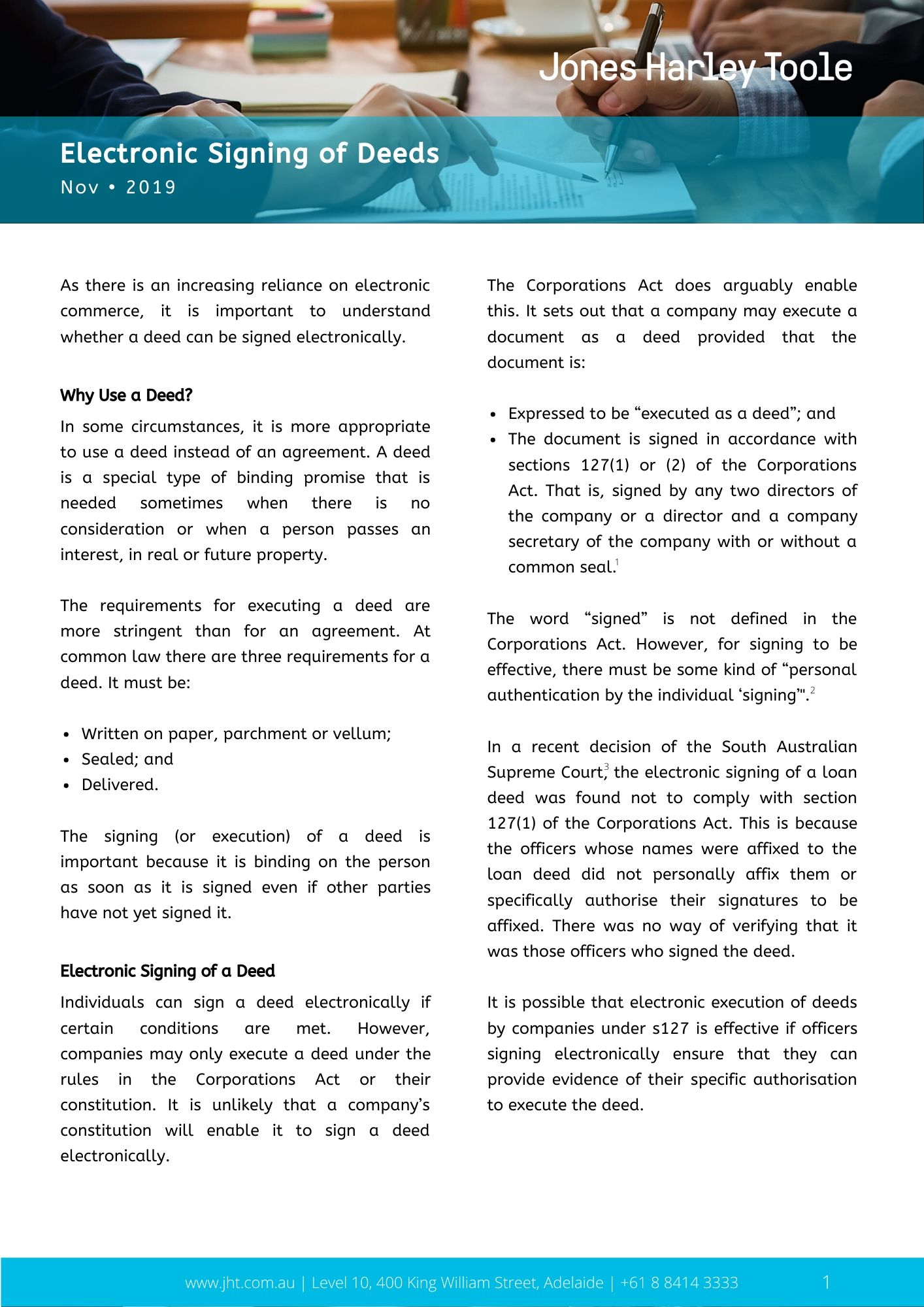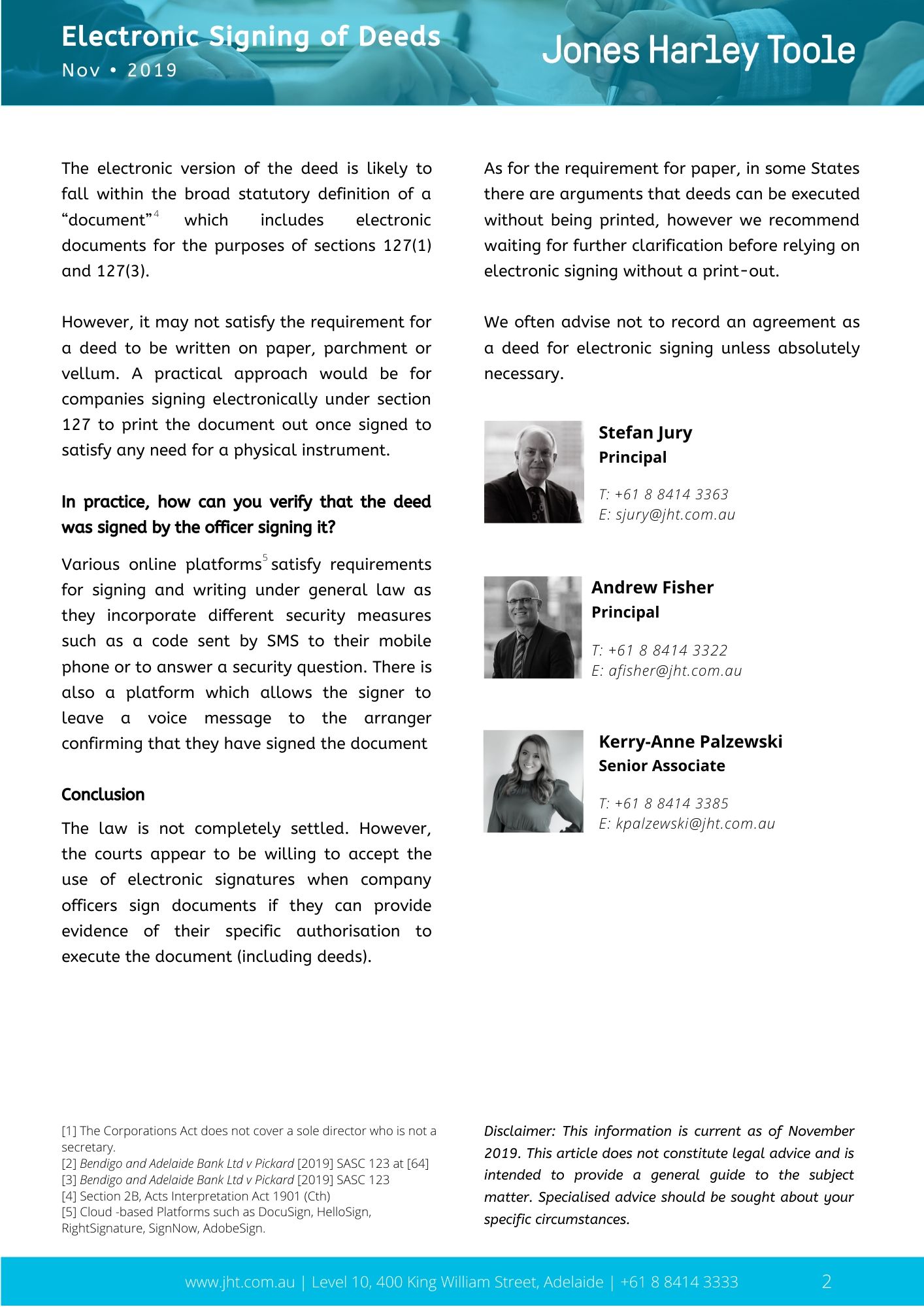ELECTRONIC SIGNING OF DEEDS

JHT CONSIDERS THE AUSTRALIAN CIVIL SPACE STRATEGY
9 May 2019LIABILITY AS A COMPANY OFFICER ALTHOUGH NOT IN OFFICE
20 March 2020Electronic Signing of Deeds
January 2020
As there is an increasing reliance on electronic commerce, it is important to understand whether a deed can be signed electronically.
Why Use a Deed
In some circumstances, it is more appropriate to use a deed instead of an agreement. A deed is a special type of binding promise that is needed sometimes when there is no consideration or when a person passes an interest, in real or future property.
The requirements for executing a deed are more stringent than for an agreement. At common law there are three requirements for a deed. It must be:
• Written on paper, parchment or vellum;
• Sealed; and
• Delivered.
The signing (or execution) of a deed is important because it is binding on the person as soon as it is signed even if other parties have not yet signed it.
Electronic Signing of a Deed
Individuals can sign a deed electronically if certain conditions are met. However, companies may only execute a deed under the rules in the Corporations Act or their constitution. It is unlikely that a company’s constitution will enable it to sign a deed electronically.
The Corporations Act does arguably enable this. It sets out that a company may execute a document as a deed provided that the document is:
• Expressed to be “executed as a deed”; and
• The document is signed in accordance with sections 127(1) or (2) of the Corporations Act. That is, signed by any two directors of the company or a director and a company secretary of the company with or without a common seal[1].
The word “signed” is not defined in the Corporations Act. However, for signing to be effective, there must be some kind of “personal authentication by the individual ‘signing’[2].
In a recent decision of the South Australian Supreme Court[3], the electronic signing of a loan deed was found not to comply with section 127(1) of the Corporations Act. This is because the officers whose names were affixed to the loan deed did not personally affix them or specifically authorise their signatures to be affixed. There was no way of verifying that it was those officers who signed the deed.
It is possible that electronic execution of deeds by companies under s127 is effective if officers signing electronically ensure that they can provide evidence of their specific authorisation to execute the deed.
The electronic version of the deed is likely to fall within the broad statutory definition of a “document”[4] which includes electronic documents for the purposes of sections 127(1) and 127(3).
However, it may not satisfy the requirement for a deed to be written on paper, parchment or vellum. A practical approach would be for companies signing electronically under section 127 to print the document out once signed to satisfy any need for a physical instrument.
In practice, how can you verify that the deed was signed by the officer signing it
Various online platforms[5] satisfy requirements for signing and writing under general law as they incorporate different security measures such as a code sent by SMS to their mobile phone or to answer a security question. There is also a platform which allows the signer to leave a voice message to the arranger confirming that they have signed the document.
Conclusion
The law is not completely settled. However, the courts appear to be willing to accept the use of electronic signatures when company officers sign documents if they can provide evidence of their specific authorisation to execute the document (including deeds).
As for the requirement for paper, in some States there are arguments that deeds can be executed without being printed, however we recommend waiting for further clarification before relying on electronic signing without a print-out.
We often advise not to record an agreement as a deed for electronic signing unless absolutely necessary.
Contact
Stefan Jury | Principal | +61 8 8414 3363 | sjury@jht.com.au
Andrew Fisher | Principal | +61 8 8414 3322 | afisher@jht.com.au
Kerry-Anne Palzewski | Senior Associate | +61 8 8414 3385 | kpalzewski@jht.com.au
References
[1} The Corporations Act does not cover a sole director who is not a secretary.
[2] Bendigo and Adelaide Bank Ltd v Pickard [2019] SASC 123 at [64].
[3] Bendigo and Adelaide Bank Ltd v Pickard [2019] SASC 123
[4] Section 2B, Acts Interpretation Act 1901 (Cth)
[5] Cloud -based Platforms such as DocuSign, HelloSign,RightSignature, SignNow, AdobeSign.
Jones Harley Toole Legal • Strategy • Business
Disclaimer: This information is current as of November 2019. This article does not constitute legal advice and is intended to provide a general guide to the subject matter. Specialised advice should be sought about your specific circumstances.
Click on the link below to view in PDF format


